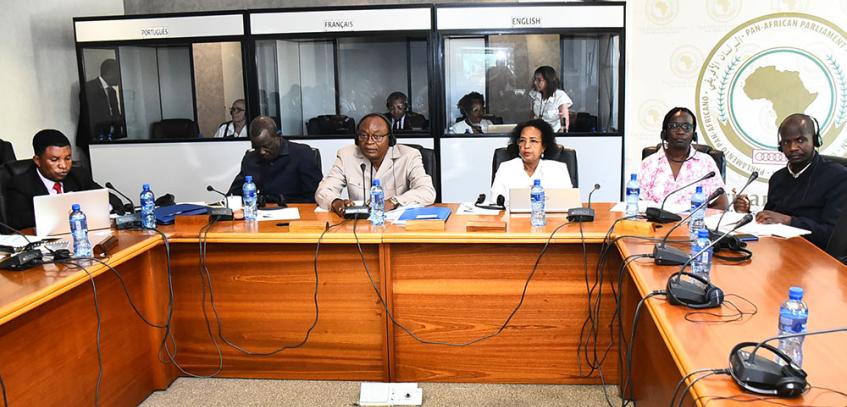The Food and Agriculture Organization (FAO) of the United Nations (UN) is engaging the Pan-African Parliament’s (PAP) Committee on Rural Economy, Agriculture, Natural Resources and Environment on a Model Climate Change Law for the continent.
Founded in 1945, FAO is an international organisation that leads international efforts to defeat hunger and improve nutrition and food security. FAO’s work is anchored on three key pillars. These include strengthening climate policy and governance; developing the country's capacity for climate action; and scaling up the action with local communities and vulnerable groups.
Addressing legislators on the occasion of the ongoing sitting of the Permanent Committees of the sixth Parliament of the PAP in Midrand, South Africa, Ms Valerie Johnston, from FAO’s Development Law Service said the UN body will provide policy and legal support for climate action on the continent.
“Our work is focused on promoting the mainstreaming of climate change considerations into national and sub-national policies,” said Johnston.
“The work also involves providing legal and institutional frameworks, strategies and development and financing plans and budgeting across agrifood systems, national social protection systems and other key sectors. We are also promoting policy and legal reforms that support and enable climate resilience, adaptation and mitigation.
“As FAO, we are also supporting countries at their request in incorporating agrifood systems considerations into their national strategies and plans, including NAPs, NDCs, long-term low greenhouse gas emission development strategies, disaster risk reduction plans and humanitarian response plans,” she added.
She further mentioned that FAO is open to supporting countries at their request in integrating overlapping climate and biodiversity considerations into relevant national plans (NDCs, NAPs, National Biodiversity Strategies and Action Plans, long-term low greenhouse gas emission development strategies, land-degradation neutrality targets) and coherently integrate biodiversity in NDCs and climate objectives in National Biodiversity Strategies and Action Plans.
Speaking on the same occasion PanAfrican Climate Justice Alliance (PACJA), Executive Director, Dr. Mithika Mwenda said the continent must formulate a Model Climate Change Law that is inclusive.
“Africa needs a Model Climate Change Law that leaves no one behind and especially highlights issues of women, men, youth, children, PWDs and frontline communities who are most vulnerable and addresses intersectionality and impacts on people,” he said adding that it must cover short-medium- and long term targets that are aligned to global, regional, national, sub-national and local level commitments and targets that are ambitious to have an impact in mitigation and adaptation strategies.
He also underscored that a Model Climate Change Law must include partnerships with public and private facing organizations and institutions leveraging on innovation and technology to meet the pace and scale of global commitments and local level contexts and actions.
“As a continent, our Model Climate Change Law, must allow for public participation and collaboration to amplify community voices and galvanize action towards locally led initiatives that are aligned with policies and strategies across all levels,” added Dr. Mwenda.
Meanwhile, Committee on Rural Economy, Agriculture, Natural Resources and Environment, Chairperson Hon. Didier Molisho Sadi has urged African legislators to prioritise and push towards adopting key points presented to them by FAO and PACJA.
“We are fortunate to have been exposed to these reach presentations. What is important as of now is to adopt and embrace all raised points. This will help us in developing our own legal framework that will assist us in handling issues relating to Climate Change,” he said.
Also present in the meeting was the PAP’s 3rd Vice President Hon. Lúcia Maria Mendes Gonçalves dos Passos (Mrs) from Cape Verde who advised African legislators to also implement Climate Change related awareness programmes in their respective communities for the continent to arrest adverse consequences of Climate Change.
The sitting is being held under the African Union Theme of the Year for 2023, “The Year of AFCFTA: Accelerating the Implementation of the African Continental Free Trade Area”.
-Ends-








